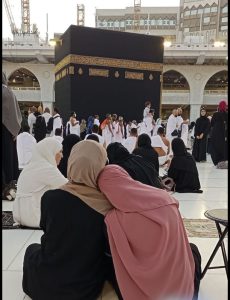HOW HAJJ PURIFIES THE SOUL FROM PRIDE

Hajj the sacred pilgrimage to Makkah is more than just a physical journey; it is a deep spiritual transformation that strips away arrogance, ego, and worldly status. It is a journey where hearts are humbled, souls are cleansed, and every believer stands equal before the Lord of the Worlds.
In the midst of millions, dressed in simple white garments, every pilgrim is reminded that in the eyes of Allah, there is no superiority based on wealth, race, or status only on taqwa (God-consciousness).
“Indeed, the most noble of you in the sight of Allah is the most righteous of you.”
(Surah Al-Hujurat, 49:13)
THE STRIPPING AWAY OF STATUS AND EGO
Before donning the ihram, a pilgrim may be a leader, a scholar, a businessman, or a worker. But once those two unstitched white garments are worn, all titles vanish. Everyone becomes the same a servant of Allah, walking in humility, submitting fully to His command.
There are no designer clothes, no ranks, and no distinctions. The rich and the poor, the known and the unknown, the powerful and the powerless all stand shoulder to shoulder in prayer, proclaiming the same words:
“Labbayk Allahumma Labbayk Here I am, O Allah, here I am.”
This unity destroys the illusion of superiority. It teaches the believer that pride has no place in the heart of one who is entirely dependent on his Creator.
THE HUMBLING RITUALS OF WORSHIP
Every act of Hajj carries a lesson in humility.
When a pilgrim circles the Ka‘bah during tawaf, he is reminded that his life should revolve around Allah alone. He walks in the crowd, shoulder to shoulder with others, his voice blending in with millions reciting praises of the Almighty no one greater than another.
When he runs between Safa and Marwah, he remembers Hajar (عليها السلام), a woman whose faith and desperation led to the miracle of Zamzam. Through her story, Hajj teaches that greatness is not found in pride or strength, but in sincere trust and submission to Allah.
When he stands on the plains of Arafah, under the blazing sun, he realizes that before Allah, every soul is equal, fragile, and in need of mercy. Tears fall freely, washing away arrogance, as the pilgrim remembers his sins and begs for forgiveness.
THE SYMBOLISM OF SACRIFICE
The sacrifice (udhiyah) of an animal during Hajj is not about the meat or the ritual itself it symbolizes the sacrifice of one’s ego.
“Their meat will not reach Allah, nor will their blood, but what reaches Him is piety from you.”
(Surah Al-Hajj, 22:37)
To truly purify the soul, one must slaughter pride, arrogance, and self-importance those inner diseases that block the heart from true servitude. Hajj teaches surrender that greatness belongs only to Allah, and humility is the path to His nearness.
THE REMINDER OF DEATH AND RETURN TO ALLAH
The ihram itself resembles the shroud in which we will one day be buried. As pilgrims leave behind their homes, comforts, and possessions, they symbolically leave behind the dunya realizing that, in the end, we return to Allah with nothing but our deeds.
This reflection softens the heart and breaks the arrogance that often grows in times of worldly comfort. When a pilgrim sees the Ka‘bah, stands at Arafah, and sheds tears in repentance, he begins to understand that true honor is not in being seen by people, but in being forgiven by Allah.
THE PURIFICATION THAT FOLLOWS
A sincere Hajj transforms the heart. The Prophet ﷺ said:
“Whoever performs Hajj and does not commit any obscenity or wrongdoing, will come out as the day he was born free from sins.”
(Bukhari & Muslim)
This purity is not only from sins, but also from the diseases of the heart pride, arrogance, and self-admiration. The one who returns from Hajj with humility, gratitude, and fear of Allah has truly purified his soul.
CONCLUSION
Hajj is not just about visiting sacred places it is about returning to your true self. It reminds the believer that all worldly distinctions vanish in the presence of Allah. It humbles the heart, cleanses the soul, and teaches that pride has no place in the heart of a servant who stands before his Creator with nothing but need.
In the simplicity of ihram, the exhaustion of the rituals, and the tears of Arafah lies the secret of purification that only through humility can the heart taste true closeness to Allah.
“And do not walk upon the earth arrogantly. Indeed, you will never tear the earth [apart], nor reach the mountains in height.”
(Surah Al-Isra, 17:37)
The pilgrim who learns this lesson returns home lighter not just free from sin, but free from pride, ready to live a life of gratitude, humility, and submission.

